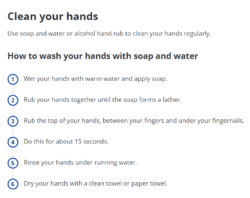Coronavirus : What you should know about COVID-19
COVID-19
With the spread of the recent coronavirus affecting different countries including Ireland, it’s important to know what you can do to help prevent the virus from spreading and protect yourself and others.
At the moment, the risk of catching coronavirus in Ireland is low to moderate with the HSE providing updates as they get more information.
What is the coronavirus?
Coronaviruses are a large family of viruses that may cause illness in animals or humans. There is more than one type of coronavirus, including the common cold and flu but COVID-19 is the most recently discovered.
How does coronavirus spread?
COVID-19 can spread in sneeze or cough droplets from a person who has the virus.
You could get the disease if you:
- Come into close contact with someone who has the virus and is coughing or sneezing
- Touch surfaces that someone who has the virus has coughed or sneezed on and then touching their eyes, nose or mouth
Symptoms of coronavirus
It can take up to 14 days for symptoms of coronavirus to appear.
The symptoms of coronavirus are:
- a cough
- shortness of breath
- breathing difficulties
- fever (high temperature)
The risk of catching coronavirus in Ireland
The risk of catching COVID-19 in Ireland is still low to moderate. This may change. However, most people may continue to go to work, school and other public places, as usual.
Follow the HSE’s advice on how to protect yourself from coronavirus.
Anyone who knows they have been in close contact with a confirmed case in the last 14 days and has symptoms (cough, shortness of breath, fever) should:
- isolate themselves from other people – this means going into a different, well-ventilated room, with a phone
- phone their GP, or emergency department – if this is not possible, phone 112 or 999
- in a medical emergency (if you have severe symptoms) phone 112 or 999
Close contact means either:
- face-to-face contact
- spending more than 15 minutes within 2 metres of an infected person
- in the same house as an infected person
When you may need to be tested for coronavirus
You will need to be tested for coronavirus if you have symptoms and have in the last 14 days been:
- in close contact with a confirmed case of coronavirus
- to a place where there is spread of coronavirus
If your doctor thinks that you need a test for COVID-19, they will tell you where the test will be done. They will also tell you when to expect your results.
Read this advice if you’ve been to a place with spread of coronavirus.
Protect yourself and others from coronavirus
Do:
- Wash your hands properly and regularly with either soap and water or an alcohol-based hand rub
- Cover your mouth and nose with a tissue or into your elbow when you cough and sneeze
- Put used tissues into a bin and wash your hands
- Clean and disinfect frequently touched objects and surfaces
- Follow the travel advice from the Department of Foreign Affairs
Don’t:
- Do not touch your eyes, nose or mouth if your hands are not clean
When to wash your hands
- After coughing or sneezing
- After toilet use
- Before and after preparing food
- Before eating
- If you are in contact with a sick person, especially those with respiratory symptoms
- If you’re hands are dirty
- If you have handled animals or animal waste
Read this step-by-step guide on how to wash hands

